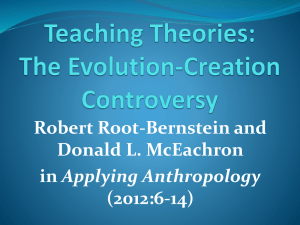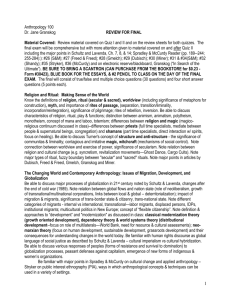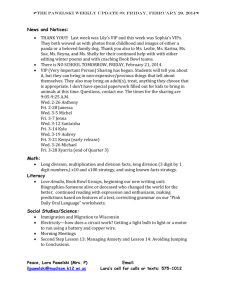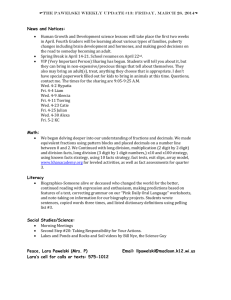ANT 206 “Cultural Anthropology”
advertisement
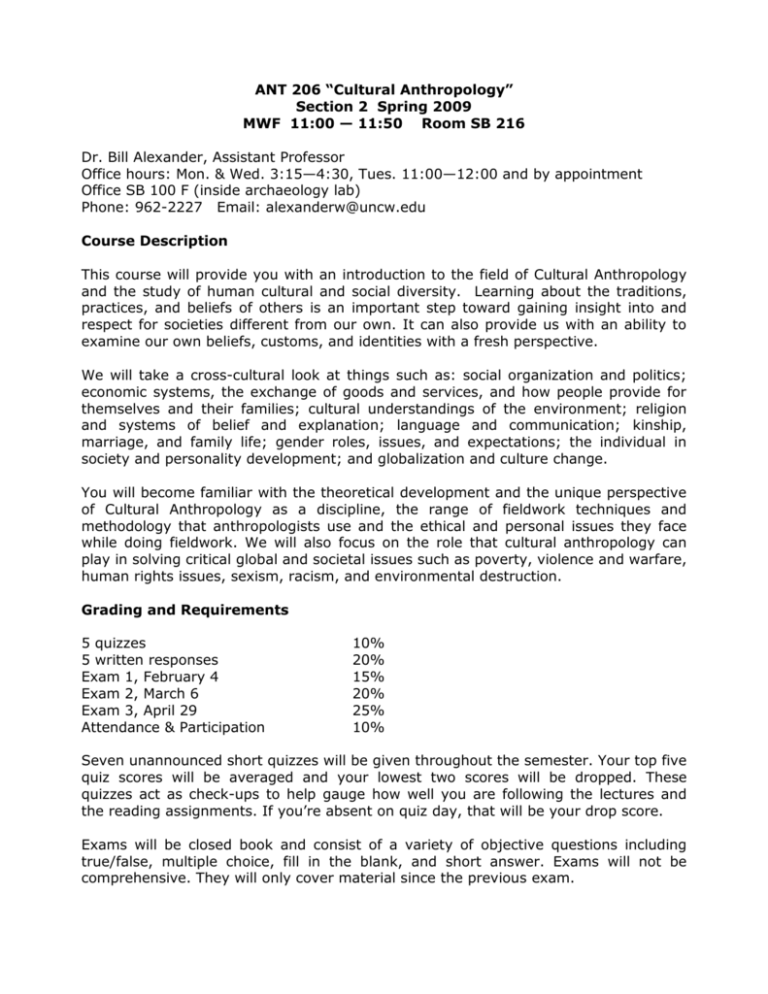
ANT 206 “Cultural Anthropology” Section 2 Spring 2009 MWF 11:00 — 11:50 Room SB 216 Dr. Bill Alexander, Assistant Professor Office hours: Mon. & Wed. 3:15—4:30, Tues. 11:00—12:00 and by appointment Office SB 100 F (inside archaeology lab) Phone: 962-2227 Email: alexanderw@uncw.edu Course Description This course will provide you with an introduction to the field of Cultural Anthropology and the study of human cultural and social diversity. Learning about the traditions, practices, and beliefs of others is an important step toward gaining insight into and respect for societies different from our own. It can also provide us with an ability to examine our own beliefs, customs, and identities with a fresh perspective. We will take a cross-cultural look at things such as: social organization and politics; economic systems, the exchange of goods and services, and how people provide for themselves and their families; cultural understandings of the environment; religion and systems of belief and explanation; language and communication; kinship, marriage, and family life; gender roles, issues, and expectations; the individual in society and personality development; and globalization and culture change. You will become familiar with the theoretical development and the unique perspective of Cultural Anthropology as a discipline, the range of fieldwork techniques and methodology that anthropologists use and the ethical and personal issues they face while doing fieldwork. We will also focus on the role that cultural anthropology can play in solving critical global and societal issues such as poverty, violence and warfare, human rights issues, sexism, racism, and environmental destruction. Grading and Requirements 5 quizzes 5 written responses Exam 1, February 4 Exam 2, March 6 Exam 3, April 29 Attendance & Participation 10% 20% 15% 20% 25% 10% Seven unannounced short quizzes will be given throughout the semester. Your top five quiz scores will be averaged and your lowest two scores will be dropped. These quizzes act as check-ups to help gauge how well you are following the lectures and the reading assignments. If you’re absent on quiz day, that will be your drop score. Exams will be closed book and consist of a variety of objective questions including true/false, multiple choice, fill in the blank, and short answer. Exams will not be comprehensive. They will only cover material since the previous exam. You will write five Written Responses covering readings placed on Electronic Reserve through the university library. These are short written assignments (approximately 1 2 pages) that will give you the opportunity to respond to some eye-opening and provocative material taken from recent ethnographies written by cultural anthropologists working in a variety of field settings. Instructions will be handed out the week before they are due. No late papers accepted. Be prepared to share your response with the class, as we will spend the period they are due discussing them as a group. If you are absent on due day, you may send that Response as an email attachment to me ahead of time. You are required to be an active participant in this course. Attending class and taking part in discussion is expected. There will be a sign-in sheet for every class meeting. Your record of attendance and participation will be taken into consideration in figuring your final grade. I reserve the right to drop anyone with chronic absenteeism. Arrive on time and don’t leave early. You will not be given credit for tardies or early departures. Cell phones are not allowed in class. Turn them off and put them away before you enter. It’s very important for you to complete each meeting’s assigned reading so that we can discuss it during class. Lectures will clarify the texts, but you will have difficulty if you haven’t kept up with the reading. Taking good notes is also necessary as I will often present material not in the books. I encourage you to visit me during office hours whenever you feel the need. If you can’t come during office hours, we can set an appointment. Academic dishonesty, cheating, and plagiarism of any kind will not be tolerated and will result in a failing grade (or worse…) Please familiarize yourself with the university’s academic honor code: http://www.uncw.edu/fac_handbook/responsibilities/teaching/honor_code_print.htm and the University Learning Center’s definition of and tips to avoid plagiarism: http://www.uncw.edu/stuaff/uls/Writing-plagiarism.htm Required Texts Emily A. Schultz and Robert H. Lavenda Cultural Anthropology: A Perspective on the Human Condition, 7th ed. Oxford UK: Oxford University Press (2009) William A. Haviland, Robert J. Gordon, Luis A. Vivanco, eds. Talking about People: Readings in Contemporary Cultural Anthropology, 4th ed. New York: McGraw-Hill (2006) The Electronic Reserve readings are accessed by going to the library reserves homepage: http://library.uncw.edu/web/customerservices/reserves.html After logging in, you can locate the reserve materials searching by course, department, or instructor. Course Schedule Wed. 1/7 Introduction to the Class ANTHROPOLOGY & THE CULTURE CONCEPT Fri. 1/9 Schultz & Lavenda pp. 1-15 “The Anthropological Perspective” Mon. 1/12 Schultz & Lavenda pp. 18-39 “Culture and the Human Condition” Wed. 1/14 Talking about People Sally Engle Merry “Human-Rights Law and the Demonization of Culture” pp. 42-44 FIELDWORK EXPERIENCES & ISSUES Fri. 1/16 Schultz & Lavenda pp. 42-73 “Fieldwork” Mon. 1/19 MLK holiday no class meeting Wed. 1/21 Talking about People Marion Benedict “Fact versus Fiction: An Ethnographic Paradox Set in the Seychelles” pp. 17-20 Fri. 1/23 Talking about People William J. Klausner “Going Native?” pp. 21-23; Jane Mulcock “Ethnography in Awkward Spaces: An Anthropology of Cultural Borrowing” pp. 45-49 Mon. 1/26 Turn in Written Response #1 on EReserve reading: Phillippe Bourgois “Violating Apartheid in the United States” from In Search of Respect: Selling Crack in El Barrio, 2ne ed. Cambridge UK: Cambridge University Press (2003) ORIGINS OF THE ANTHROPOLOGICAL PERSPECTIVE Wed. 1/28 Schultz & Lavenda pp. 64-73 “Anthropology in History and the Explanation of Cultural Diversity” Fri. 1/30 Schultz & Lavenda pp. 76 – 99 “Anthropology in History and the Explanation of Cultural Diversity” Mon. 2/2 exam review Wed. 2/4 exam 1 LANGUAGE & LINGUISTIC ANTHROPOLOGY Fri. 2/6 Schultz & Lavenda pp. 102–129 “Language” Mon. 2/9 Talking about People William M. O’Barr and John M. Conley “When a Juror Watches a Lawyer pp. 52-55 Wed. 2/11 pp. 59-67 Talking about People Jane Hill “Language, Race, and White Public Space” Fri. 2/13 Talking about People Jacqueline Urla “Euskara: The ‘Terror’ of a European Minority Language” pp. 69-71 SOCIALIZATION & THE INDIVIDUAL IN CULTURE, MEDICAL ANTHROPOLOGY Mon. 2/16 Turn in Written Response #2 on EReserve reading: Alma Gottlieb “Chapter Four Spiritual Beng Babies“ in The Afterlife is Where We Come From: The Culture of Infancy in West Africa (Chicago: University of Chicago Press, 2006), 79– 104 Wed. 2/18 Talking about People Alma Gottlieb “The Anthropologist as Mother: Reflections on Childbirth Observed and Childbirth Experienced” pp. 77-83 Fri. 2/20 Talking about People Amparo Ojeda “Growing Up American: Doing the Right Thing” pp. 74-76 Mon. 2/23 Turn in Written Response #3 on EReserve reading: Paul Farmer “On Suffering and Structural Violence” Pathologies of Power: Health, Human Rights, and the New War on the Poor, Berkeley CA: University of California Press (2003) RELIGION & WORLDVIEW Wed. 2/25 Schultz & Lavenda pp. 200-229 “Worldview” Fri. 2/27 Talking about People Isak Niehaus “Witchcraft in Anthropological Perspective” pp. 225-230 Mon. 3/2 233 Talking about People Silvia Rodgers “Feminine Power at Sea” pp. 231- Wed. 3/4 exam review Fri. 3/6 exam 2 SPRING BREAK GLOBALIZATION, DEVELOPMENT, & HUMAN RIGHTS Mon. 3/16 Schultz & Lavenda pp. 260-285 “Making a Living” Wed. 3/18 Talking about People Daniel Stiles “Nomads on Notice” pp. 89-91; Marcus Colchester “Conservation Policy and Indigenous People” pp. 103-108 Fri. 3/20 no class meeting, Dr. Alexander will be attending the Society for Applied Anthropology (SfAA) annual meeting in Santa Fe, NM. Use this time to work on your next response paper Mon. 3/23 Turn in Written Response #4 on EReserve reading Steven Gregory “Chapter One The Politics of Livelihood“ in The Devil Behind the Mirror: Globalization and Politics in the Dominican Republic (Berkeley CA: University of California Press, 2007), 11–49 Wed. 3/25 Talking about People James Ferguson “The Anti-Politics Machine: ‘Development’ and Bureaucratic Power in Lesotho” pp. 251-257 Fri. 3/27 Talking about People Alex de Waal “In the Disaster Zone: Anthropologists and the Ambiguity of Aid” pp. 263-266; Steven L. Rubenstein “Shuar Migrants and Shrunken Heads Face to Face in a New York Museum” pp. 269-274 Mon. 3/30 Schultz & Lavenda pp. 394-435 “A Global World” Wed. 4/1 Schultz & Lavenda pp. 232-257 “Culture & Power” Fri. 4/3 Schultz & Lavenda pp. pp. 360-391 “Dimensions of Inequality in the Contemporary World” Mon. 4/6 Talking about People Pierre L. van den Berge “The Modern State: NationBuilder or Nation-Killer”? pp. 209-217; Alex de Waal “The Genocidal State: Hutu Extremism and the Origins of the ‘Final Solution’ in Rwanda” pp. 191-196; Elizabeth Garland “An Anthropologist Learns the Value of Fear” pp. 197-200 Wed. 4/8 Schultz & Lavenda “Anthropology in Everyday Life” pp. 438-458 Fri. 4/10 EASTER BREAK Mon. 4/13 Turn in Written Response #5 on EReserve readings: Beatriz Manz excerpt from Paradise in Ashes: A Guatemalan Journey of Courage, Terror, and Hope (2004) Berkeley CA: University of California Press; and Victoria Sanford excerpt from Buried Secrets: Truth and Human Rights in Guatemala (2003) New York: Palgrave-McMillan KINSHIP, GENDER, MARRIAGE & FAMILY LIFE Wed. 4/15 Schultz & Lavenda pp. 288-322 “Imagined Communities: Kinship and Other Forms of Relatedness Fri. 4/17 Schultz & Lavenda pp. 326-357 “Marriage and Family” Mon. 4/20 Talking about People Serena Nanda “Arranging a Marriage in India” pp. 145-149; Lu Yuan and Sam Mitchell “Land of the Walking Marriage” pp. 158-160 Wed. 4/22 Talking about People; Brett Williams “Why Migrant Women Feed Their Husbands Tamales: Foodways as a Basis for Revisionist View of Tejano Family Life” pp. 150-157; Thomas Maschio “The Refrigerator and American Ideas of ‘Home’” pp. 166-167 Fri. 4/24 Talking about People Roger N. Lancaster “The Place of Anthropology in a Public Culture Reshaped by Bioreductivism” pp. 127-129; Peter Wood and Ellen Lewin “Gay and Lesbian Marriage” pp. 134-140 Mon 4/27 exam review Wed. 4/29 FINAL EXAM, 11:30


